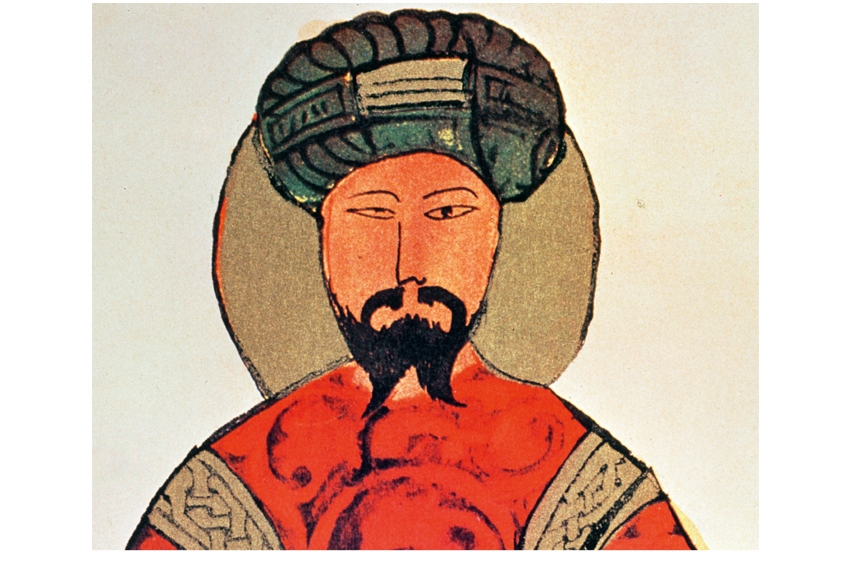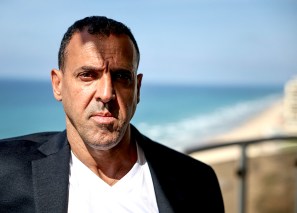In Baghdad in the 1980s there was a children’s book published called The Hero Saladin. The cover bore an image of Saddam Hussein, identified, in what his biographer drily describes as ‘the second and longer part’ of the book, as ‘Saladin II Saddam Hussein’.
Given that Saladin was actually Kurdish — and knowing what we do about Saddam’s respect for that section of his population — the gesture seems even more crass and insolent than it might otherwise. But then, it’s also absolutely standard. Jinnah was Saladin. Assad was Saladin. Saladin is, in modern Arab and Muslim political mythology, more icon than historical figure. If the anti-imperialist rhetoric of the Arab street in the 20th century were the sentimentality of English football fans, he’d be Bobby Moore.
Anne-Marie Eddé remarks in a punchy moment that she prefers to ‘use the term “myth” rather than “legend” ’ of these representations — because the Western Saladin is at least a distortion of actual history, whereas ‘the Saladin myth in Arab countries is closer to a political construction that freely and subjectively interprets a historical reality to adapt it to a given situation’.
That’s not such a clear distinction as she makes it sound, perhaps; but it nods to how live an issue this is. Our Saladin — chivalrous, honourable, near-as-dammit Christian and (in the providential apologetics of the Crusades) an instrument of God’s will — gets his start in medieval chansons de geste. He’s the worthy opponent of Richard the Lionheart. The Eastern myth of Saladin gets going much later — with the rise of Arab nationalism in the 19th century. And it is — which I guess is Eddé’s point about myth versus legend — not the stuff of romance so much as of propaganda.
So this fastidious and superbly well researched book is, in some ways, the biography of an idea. We don’t know all that much about the historical Saladin, and next to nothing about him personally — not even what he looked like. We know a bit about what he did, though. We know he was a clever man: a brilliant politician and strategist. Much of the myth that has grown up around him, to go by this biography, was rooted in fact.
He was generous. He was pious. He patronised literature and science. He did unify the Muslim world; and, in 1187, he did recapture Jerusalem — though he muffed, arguably, his chance to see the Franks off for good by failing to capture Tyre. That was, perhaps, characteristic: he was always a leader who hedged his bets, preferring negotiation to conflict, and encirclement to frontal assault.
Here was a man for whom politics was the continuation of war by other means. When he started out, the Muslim world was divided between the Fatimid, Shi’ite caliph in Cairo and the Abbasid, Sunni caliph in Baghdad. Saladin — a Tikrit-born Sunni (like Saddam Hussein), in the service of the sultan Nur al-Din — became vizier in Cairo and, softly, softly catchee monkey, he effected the deposition of the Fatimid caliphate.
After the death of Nur al-Din, he was equally feline in positioning himself as his successor — cutting deals with the local emirs, sucking up to the Abbasid caliph (no political or military authority could long survive without religious authority to back it), and surrounding the Zangid stronghold of Aleppo without besieging it. Plus, he married Nur al-Din’s widow, which may have helped.
His central platform in his pitch to the caliph was that only he was capable of uniting the Islamic world against the Franks. Piety and political expediency added up to the same thing. Also, as soon becomes clear, the heroic myth of Saladin was cultivated, quite consciously, by Saladin himself.
He was also — easy for the mythographers to make redound to his credit, but still endearing — hopeless with money. Eddé writes amusingly: ‘In praise of his generosity, Saladin’s panegyrists report many anecdotes that attest to a total absence of foresight in the area of budget management.’
What’s really striking in this book — at least to those of us fuzzily disposed from our school history lessons, or our study of Fox News, to see jihad on one side and crusade on the other as implacable wars of religious fanaticism — is how civilised the whole business was.
Franks were sometimes enemies to be fought, and sometimes outsiders to be hired or bought off in intra-Muslim power struggles. Trade between East and West continued willy-nilly. The wood, pitch and iron with which Saladin built the Egyptian
fleet had to come from Italy, and did — however much the Papacy raged that raw materials that would be used to fight the Franks were being sold to the enemy by their compatriots. Captives were ransomed, pilgrims given free (and sometimes protected) passage, treaties honoured.
In the funduqs — facilities for Genoese or Pisan merchants to trade — we see something like conference centres, trade expos or export processing zones. And in his 1183 decree detailing the duties of the muhtasib of Aleppo — the man in charge of regulating the markets — Saladin set out a remit that involved moral care (‘intoxicating beverages … let him spill them on the ground’), policing fraud on weights and measures, and even a sort of advertising standards fatwa:
Let him pursue the cheapjacks and charlatans who practise medicine in the manner of astrologists; let him prevent them from selling adulterated and unfamiliar medications, and from inventing for them uncommon names not known by the ancients.
Here was a man of liberal and pragmatic instincts. That Saladin was so absolute with his captive Reginald of Châtillon (he beheaded him personally, which some would see as a bit stiff) was down in part to Reginald’s repeated failure to keep his oaths — and was, importantly, expressly justified under Muslim law. Saladin took a very firm line against traitors, oath-breakers and turcopoles (Muslim converts to Christianity fighting for the Franks). Other of his enemies he treated with great courtesy and generosity.
He had many Christian and Jewish secretaries in his retinue, and submitted to the attentions of doctors from all three faiths. Freedom of worship for dhimmi — ‘infidels’ living in Muslim territories — was honoured, many unfair taxes removed, and — though as the author acknowledges it’s hard to sift truth from propaganda — by no means all Middle Eastern Christians regarded Saladin’s capture of Jerusalem from their co-religionists as a bad thing.
Eddé’s account of Saladin’s life doesn’t always crackle on the page — its academic pedigree comes above narrative attack, and there’s an earnest theme-by-theme arrangement — but it is always lucid and sensible, and instils complete confidence in the reader. The facts are here. And, such as they are, they suffice to make you think living under Saladin’s rule would be far from the worst situation you could be in if you found yourself in the late 12th century.
Above all, this book is valuable for giving us a sense of what the Crusades looked like from the other side. My favourite passages were those in which you got a sense of the benign bafflement with which Muslims then viewed Christianity (as, no doubt, vice-versa).
A mid-12th-century Syrian text reported:
The most amazing thing in the world is that the Christians say that Jesus is divine, that he is God, and then they say that the Jews seized him and crucified him. How then can a God who cannot protect himself protect others? Anyone who believes his God came out of a woman’s privates is quite mad; he should not be spoken to, for he has neither intelligence nor faith.
There, rather wonderfully, is just the sort of conversation that, 1,000 years later, is still going on.







Comments